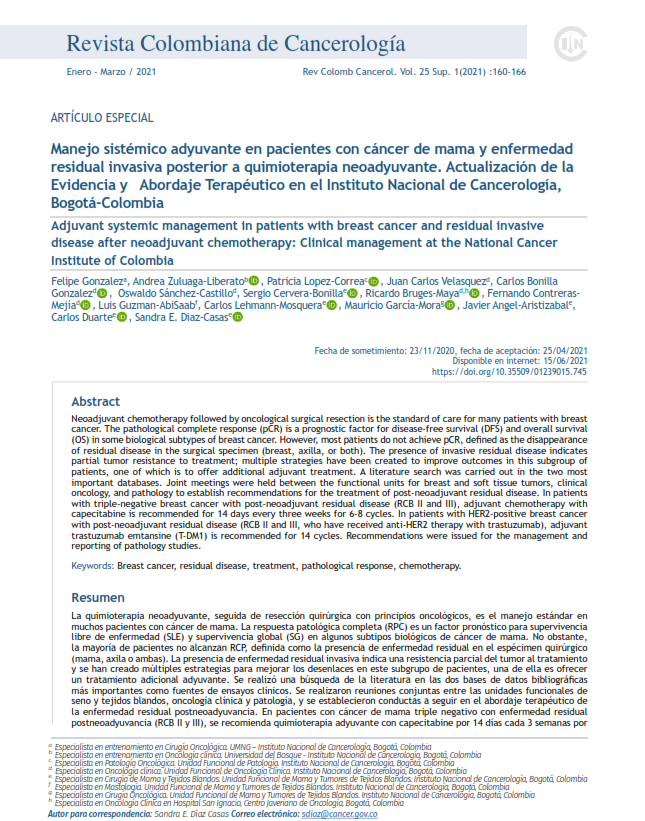Adjuvant systemic management in patients with breast cancer and residual invasive disease after neoadjuvant chemotherapy: Clinical management at the National Cancer Institute of Colombia
DOI:
https://doi.org/10.35509/01239015.745Keywords:
Breast cancer, residual disease, treatment, pathological response, chemotherapyAbstract
Neoadjuvant chemotherapy followed by oncological surgical resection is the standard of care for many patients with breast cancer. The pathological complete response (pCR) is a prognostic factor for disease-free survival (DFS) and overall survival (OS) in some biological subtypes of breast cancer. However, most patients do not achieve pCR, defined as the disappearance of residual disease in the surgical specimen (breast, axilla, or both). The presence of invasive residual disease indicates partial tumor resistance to treatment; multiple strategies have been created to improve outcomes in this subgroup of patients, one of which is to offer additional adjuvant treatment. A literature search was carried out in the two most
important databases. Joint meetings were held between the functional units for breast and soft tissue tumors, clinical oncology, and pathology to establish recommendations for the treatment of post-neoadjuvant residual disease. In patients with triple-negative breast cancer with post-neoadjuvant residual disease (RCB II and III), adjuvant chemotherapy with capecitabine is recommended for 14 days every three weeks for 6-8 cycles. In patients with HER2-positive breast cancer with post-neoadjuvant residual disease (RCB II and III, who have received anti-HER2 therapy with trastuzumab), adjuvant
trastuzumab emtansine (T-DM1) is recommended for 14 cycles. Recommendations were issued for the management and reporting of pathology studies.
References
Cortazar P, Zhang L, Untch M, et al. Pathological complete response and long- term clinical benefit in breast cancer: the CTNeoBC pooled analysis. Lancet 2014; 384:164-72. https://doi.org/10.1016/S0140-6736(13)62422-8.
Kuroi K, Toi M, Ohno S, et al. Prognostic significance of subtype and pathologic response in operable breast cancer; a pooled analysis of prospective neoadjuvant studies of JBCRG. Breast Cancer 2015; 22:486-95. https://doi.org/10.1007/s12282-0130511-1
Diaz-Casas S, Castilla-Tarra J, Pena-Torres E, et al. Pathological response to neoadjuvant chemotherapy and the molecular classification of locally advanced breast cancer in a Latin American cohort. The oncologist 2019;24:1–11. https://doi.org/10.1634/theoncologist.2019-0300
Masuda N, Lee SJ, Ohtani S, et al. Adjuvant Capecitabine for Breast Cancer after Preoperative Chemotherapy. N Engl J Med 2017; 376:2147. https://doi.org/10.1056/NEJMoa1612645
Von Minckwitz G, Huang CS, Mano MS, et al. Trastuzumab Emtansine for Residual Invasive HER2-Positive Breast Cancer. N Engl J Med 2019; 380:617. https://doi.org/10.1056/NEJMoa1814017
Mrkonjic M, Berman HK, Done SJ, et al. Breast specimen handling and reporting in the postneoadjuvant setting: challenges and advances. J Clin Pathol 2019; 72:120-132. https://doi.org/10.1136/jclinpath-2018-205598
Provenzano E, Bossuyt V, Viale G, et al. Standardization of pathologic evaluation and reporting of postneoadjuvant specimens in clinical trials of breast cancer: recommendations from an international working group. Modern Pathology 2015; 28: 1185-1201. https://doi.org/ 10.1038/modpathol.2015.74.
Han R, Regpala S, Slodkowska E, et al. Lack of Standardization in the Processing and Reporting of Post-Neoadjuvant Breast Cancer Specimens. Arch Pathol Lab Med-vol 144, October 2020. https://doi.org/ 10.5858/arpa.2019-0539-OA
How to Cite
Downloads

Downloads
Published
Issue
Section
License
Todos los derechos reservados.




